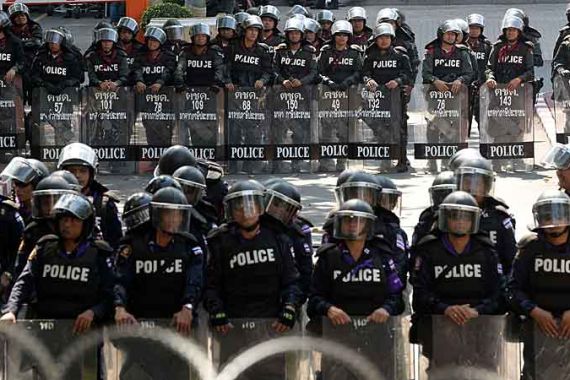Southeast Asia: Growth and turmoil
An economic downturn in some countries, political unrest in Thailand and the push for higher wages made headlines.

Southeast Asia captured its fair share of headlines in 2013 with a downturn of high-flying economic growth in its most vibrant countries, political upheaval, deadly natural disasters, and a push for better worker wages.
The region’s largest economy, Indonesia, witnessed hundreds of thousands of people taking to the streets to demand a higher minimum wage. The country’s biggest trade unions demanded a 50 percent provincial increase in November. Thirty-three governors responded by upping minimum pay by an average of 19 percent.
Last year, the minimum wage was boosted in several regions, including the capital Jakarta where monthly salaries jumped 43.9 percent to US$180 per month, and East Kalimantan where it shot up 48.9 percent $150 a month.
Concerns have been raised about Indonesia’s competitiveness and standing as Southeast Asia’s economic powerhouse amid the minimum wage hikes. The International Monetary Fund says the country’s economic growth for 2013 will stand at 5.0 to 5.5 percent, down from 6.2 percent in 2012.
Political unrest
In Thailand – Southeast Asia’s second-largest economy – political turmoil once again reared its head with tens-of-thousands of anti-government protesters swarming to key offices demanding an end of the rule of Prime Minister Yingluck Shinawatra. Many say Yingluck’s brother, ousted Prime Minister Thaksin Shinawatra, is running the country from exile in Dubai.
Demonstrations turned violent in December with five people killed and hundreds injured as rock-throwing protesters squared off against tear-gas firing riot police. Yingluck dissolved the house and called an election for February 2. Thaksin-backed political parties have won every Thai election since 2001, with the majority rural voters supporting their populist policies.
In neighbouring Myanmar, reforms that have swept over the military-ruled country continued as it opens up politically and economically. Once a villain of the West, the country has seen the removal of crippling sanctions since 2010 when President Thien Sien, a former general in the long-ruling junta, announced political, social, and economic reforms would be launched.
Opposition figure Aung San Suu Kyi – a Nobel Prize laureate – was released from years of house arrest, and her National League for Democracy party was allowed to engage in political activity. One test of its commitment to political reform will be seen in 2015 elections. Myanmar’s laws state Suu Kyi is unable to run for the presidency because she was once married to a foreign national. Calls have grown in the West for Suu Kyi to be allowed to contest the vote.
Natural disasters
The Philippines suffered severe natural disasters in 2013 that killed thousands of people and displaced many others. Typhoon Haiyan – the strongest storm ever to make landfall – slammed into the country in November, killing at least 5,700 people.
At a climate change summit, Filipino diplomat Naderev Sano tearfully called on world powers to address global warming, linking the severity of Super Typhoon Haiyan to it.
A month earlier, at least 160 people died when a 7.2-magnitude earthquake rocked several islands in the central Philippines.
In Malaysia, 2013 marked a major loss of support at elections for the long ruling coalition led by the United Malays National Organisation (UMNO). It was the worst election result of the 56-year rule of the Barisan Nasional government led by Prime Minister Najib Razak.
The opposition claimed voter rolls were full of irregularities, but the government denied that the election was unfair.